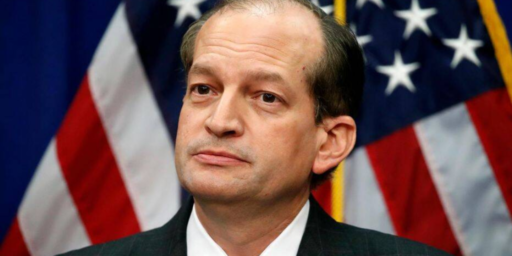Constitution in Exile
Jeffrey Rosen has a lengthy piece in the New York Times Magazine arguing that Justice Clarence Thomas is part of a radical libertarian movement hoping to restore the Constitution to its pre-New Deal interpretation.
[During the 1991 Thomas confirmation] hearings, Joseph Biden, the Delaware Democrat who was chairman of the Senate Judiciary Committee, voiced a concern about Thomas’s judicial philosophy. In particular, he singled out a speech that Thomas gave in 1987 in which he expressed an affinity for the ideas of legal scholars like Richard A. Epstein. A law professor at the University of Chicago, Epstein was notorious in legal circles for his thesis that many of the laws underpinning the modern welfare state are unconstitutional. Thomas tried to assure Biden that he was interested in ideas like Epstein’s only as a matter of ”political theory” and that he would not actually implement them as a Supreme Court justice. […]
At the time, it was impossible to know whether Biden was right to worry. He was surely right, though, that Epstein was promoting a legal philosophy far more radical in its implications than anything entertained by Antonin Scalia, then, as now, the court’s most irascible conservative. As Epstein sees it, all individuals have certain inherent rights and liberties, including ”economic” liberties, like the right to property and, more crucially, the right to part with it only voluntarily. These rights are violated any time an individual is deprived of his property without compensation — when it is stolen, for example, but also when it is subjected to governmental regulation that reduces its value or when a government fails to provide greater security in exchange for the property it seizes. In Epstein’s view, these libertarian freedoms are not only defensible as a matter of political philosophy but are also protected by the United States Constitution. Any government that violates them is, by his lights, repressive. One such government, in Epstein’s worldview, is our government. When Epstein gazes across America, he sees a nation in the chains of minimum-wage laws and zoning regulations. His theory calls for the country to be deregulated in a manner not seen since before Franklin D. Roosevelt’s New Deal.
After Thomas joined the Supreme Court, Biden’s warnings seemed prescient. In 1995, echoes of Epstein’s ideas could be clearly heard in one of Thomas’s opinions. By a 5-4 majority in United States v. Lopez, the court struck down a federal law banning guns in school zones, arguing that the law fell outside Congress’s constitutional power to regulate interstate commerce. Lopez was a judicial landmark: it was the first time since the New Deal that the court had limited the power of the federal government on those grounds. Thomas, who sided with the majority, chose to write a separate opinion in which he suggested that even his conservative colleagues had not gone far enough. The real problem, he wrote, was not just with the law at hand but with the larger decision of the court during the New Deal to abandon the judicial doctrines of the 19th century that established severe limits on the government’s power. He assailed his liberal colleagues for characterizing ”the first 150 years of this Court’s case law as a ‘wrong turn.”’ He continued, ”If anything, the ‘wrong turn’ was the Court’s dramatic departure in the 1930’s from a century and a half of precedent.”
Thomas did not cite Epstein directly in his opinion. But to anyone familiar with Epstein’s writings, the similarities were striking. Indeed, Thomas’s argument closely resembled one Epstein had made eight years earlier in ”The Proper Scope of the Commerce Power” in the Virginia Law Review — so closely, in fact, that Sanford Levinson, a liberal law professor at the University of Texas, accused Thomas of outright intellectual theft. (”The ordinary standards governing attribution of sources — the violation of which constitutes plagiarism — seem not to apply in Justice Thomas’s chambers,” Levinson wrote in the Texas Law Review.) Biden’s fear that Epstein’s ideas might be written into law had apparently been realized. And the fear would continue to be realized in other courts throughout the 90’s as a small but energetic set of lower-court judges, sympathetic to libertarian arguments, tried to strike down aspects of the Clean Water Act, the Endangered Species Act and other laws, challenging powers of the federal government that had come to be widely accepted during the second half of the 20th century.
Volokh conspirator David Bernstein argues, quite persuasively, that there is no such thing as a Constitution in exile movement, except in the minds of liberal conspiracy theorists.
I would argue though, that Epstein, and to the extent he agrees with him, Thomas are essentially right in their view of the Constitutionality of much of the post-New Deal regulatory state. Most of the early New Deal regulations were quite properly struck down by the Supreme Court. The idea that the federal government had the power to mandate huge public welfare programs was held to be far outside the scope of the Commerce Clause or any other conceivable constitutional delegation of power. Franklin Roosevelt intimidated the courts, though, with his plan to expand its membership and pack it with those sympathetic to his views. While that threat created a lot of uproar and was ultimately not enacted, the Court nonetheless got the message and soon reversed itself. By 1937, with NLRB v. Jones & Laughlin Steel, the Court created out of thin air an absurdly broad interpretation of the federal commerce power that opened the door not only for the New Deal but the modern regulatory state.




Yea! Forward into the Past! Let’s relive our glory days when Jim Crow ruled and the first amendment was only a dream waiting to be enforced.
Morons.
It does little good to stick one’s fingers in one’s ears and cry “I can’t hear you”, as some appear to want to do.
Constitutional theory has had a number of underpinnings over the years. None commands (or has commanded) unanimity in the past, and none is likely to command such now or in the future.
To suggest that only one view is “legitimate” and anyone holding another is cause for being labled a “moron” is to betray a lack of knowledge of our constitutional history.
Keep your eyes out this week and next for some penetrating analysis on Volokh, Bainbridge, Althouse, and other non-demonizing lawprofs.
I don’t think it would do any good to point out to conservatives that the US constitution, in plain language makes the adherence to treaties, including the UN treaty, the SUPREME LAW OF THE LAND.
Article VI, Clause 2: This Constitution, and the Laws of the United States which shall be made in Pursuance thereof; and all Treaties made, or which shall be made, under the Authority of the United States, shall be the supreme Law of the Land; and the Judges in every State shall be bound thereby, any Thing in the Constitution or Laws of any State to the Contrary notwithstanding.
It’s not just that FDR intimidated the Supreme Court, but as I explained today in my blog, he appointed eight Justices to the court, completely remaking it.
Ken,
No, you do not need to remind conservatives that the constitution says what it says, but I would be remiss to remind you that the article you cite applies to treaties the United States Congress actually ratifies.
No, I do not want a U.S. court to interpret our law based on a foriegn court’s opinion or via a treaty the U.S. refuses to become a signatory to.
Ken, that passage says that the Constitution and Federal law and Treaties duely ratified are the supreme law of the land.
That tells me that a treaty may be overruled on constitutional grounds (just like laws can) or superceded by a law passed later.
In the case of the UN treaty, consider the War Powers Act and specific use-of-force resolutions passed by Congress.
Antonin is “Prone to outbursts of temper; easily angered”?
If you really want to understand the constitution read the federalist papers. After all these are some of the guys that wrote it.
The federalist papers are only half the story though. You need to read the anti-federalist papers to hear about the other side of the ratification debate and to really understand that the founding fathers were not of one mind concerning the interpretation of the constitution.
Everyone seems to forget that our country is supposed to have a balance of power between the Legislative, Executive and Judical branches.
Our congress has forgotton that, as well as the Executve and the Judicial. Everyone in our government has demonstrated their hungar for power and seem to go to any length to exercise it. The result is and has been the roadmap to our own selfdistruction.
For a nonexistent movement, this one certainly has a lot of support.
Your piece has, curiously, summoned my recollections of Joe Biden questioning Robert Bork at his own ill-fated confirmation hearings — just the idea that Biden thought he could engage Bork as an intellectual peer was preposterous, but it became painfully clear that (1) Biden had been minutely coached by some law review sharpie, and (2) still fully incapable of keeping up with Bork.
What a grave loss it was, not to have Bork on the Court.
Interesting how they want to strike down the ESA and the CWA. I think the two are generally considered by anyone not-evil to be wholly good.
The people who don’t support it have never been to Asia, it seems, where no such clean water laws exist and subsequently their water is undrinkable, spreading massive disease, stunted growth, and a host of other problems.
I agree that the courts need to be stronger on congress, but jesus christ, look at the patriot act, not the damned endangered species act.
Let’s just pave over the whole country and call it progress.